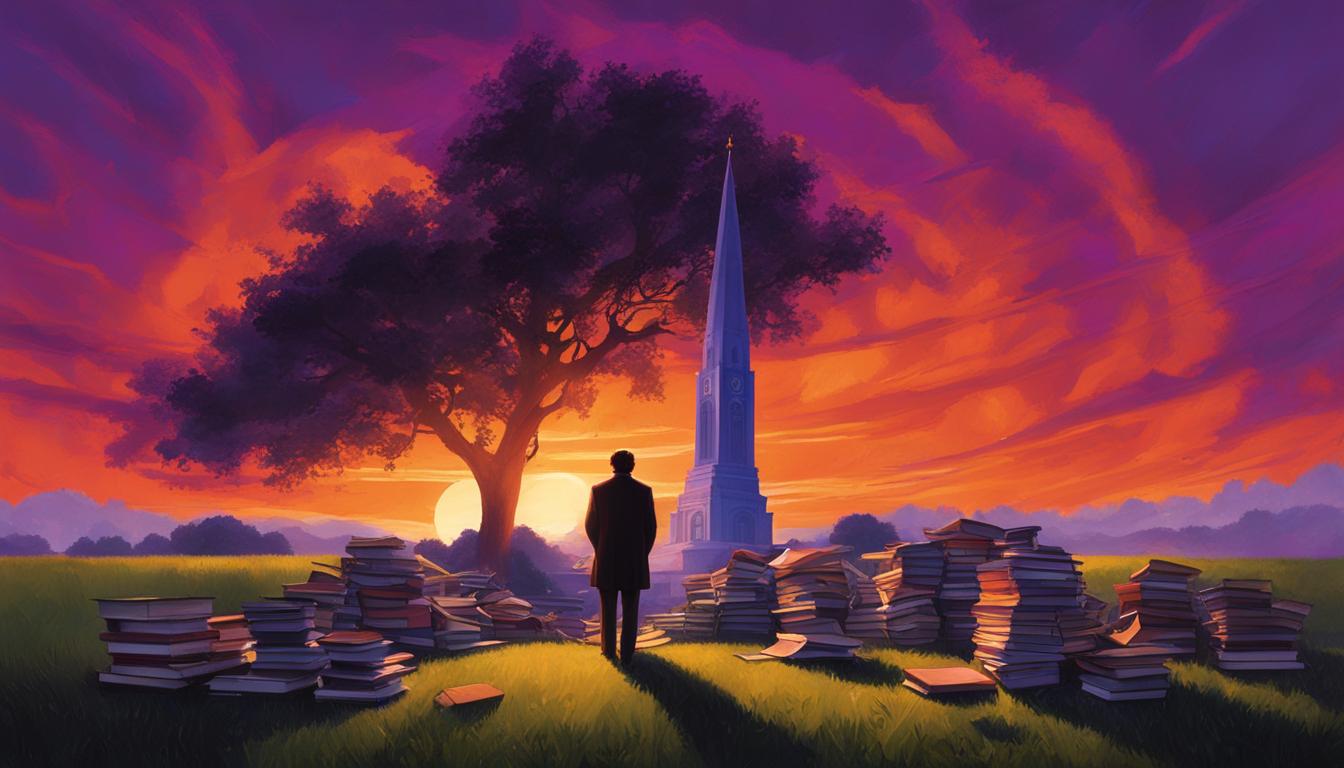Welcome to our in-depth analysis of Stephen King’s novel “11/22/63.” As one of King’s most celebrated works, this book has cemented its status as a masterpiece in his body of work. In this article, we will delve into the intricate plot, multi-dimensional characters, and underlying themes that make this book a must-read for any Stephen King fan.
Whether you are a seasoned reader of Stephen King’s horror tales or a newcomer to his writing, “11/22/63” offers something for everyone. Let’s take a closer look at why this book has captured the imagination of readers around the world.
In this article, we will examine the impact of “11/22/63” on popular culture, the historical context of the Kennedy assassination, and Stephen King’s unique writing style. Join us as we unravel the secrets of this captivating story and explore the many facets of Stephen King’s literary genius.
Stephen King: A Literary Icon
Stephen King is one of the most prolific and revered writers of our time. With over 60 novels and countless short stories to his credit, King has captivated readers with his unique storytelling ability. He is a literary icon who has had a profound impact on the horror genre and beyond.
King’s appeal stems from his ability to create relatable characters that readers can’t help but invest in emotionally. His vivid imagination creates a richly imagined world in which his stories take place, drawing readers in and keeping them engaged throughout the narrative.
King’s contribution to the horror genre cannot be overstated. He has redefined the genre and opened it up to a wider audience, with works such as “Carrie,” “The Shining,” and “It” becoming household names. He has also delved into other genres, such as fantasy and science fiction, with works like “The Dark Tower” series and “Under the Dome.”
King’s reputation as one of the greatest writers of his generation is well-earned and continues to this day. His work has been translated into multiple languages and adapted for film and television, cementing his place in popular culture.
The Impact of Stephen King’s Work
| Contribution | Impact |
|---|---|
| Redefined the horror genre | Expanded the genre to new audiences and influenced other writers |
| Created iconic characters | Brought memorable characters to life and made readers care deeply about their fates |
| Engaged readers with vivid descriptions | Created richly imagined worlds that readers can’t help but feel a part of |
| Demonstrated the power of storytelling | Inspired countless writers and helped elevate the status of genre fiction |
Stephen King’s impact on literature and popular culture is undeniable. He is a master storyteller and a literary icon, and his works will continue to captivate readers for generations to come.
Unraveling the Plot of 11/22/63
Stephen King’s “11/22/63” is a thrilling novel that explores the concept of time travel and its consequences. The central plot is centered around the character of Jake Epping, a high school teacher who discovers a way to travel back in time to prevent the assassination of President John F. Kennedy on November 22nd, 1963.
The book takes readers on a journey through time, exploring various historical events and their potential to change the course of history. Throughout the story, Jake encounters a cast of complex characters, each with their own motives and desires. His mission becomes complicated as he faces moral dilemmas and unforeseen obstacles.
The main theme of the book is time travel, and King expertly weaves this concept into the plot, exploring its far-reaching implications. He delves into the idea of altering history and the potential consequences that can arise.
As the story progresses, Jake becomes increasingly immersed in his mission, and the stakes are raised higher and higher. The plot thickens as he faces new challenges and obstacles, and readers are left on the edge of their seats, wondering what will happen next.
Overall, the plot of “11/22/63” is a masterful achievement, showcasing Stephen King’s skill as a storyteller and his ability to captivate readers from start to finish.
Time Travel in 11/22/63
Time travel is a central concept in Stephen King’s “11/22/63” which propels the narrative forward and sets the foundation for the plot. The protagonist, Jake Epping, uses a time portal to travel back to 1958 with a mission to prevent the assassination of John F. Kennedy on November 22, 1963. As the story progresses, Epping finds himself immersed in a different era, confronting new challenges and discovering unexpected consequences.
The theme of time travel is not a new concept in science fiction, but King brings a unique perspective to it by focusing on the consequences of altering historical events. The novel explores the butterfly effect, which dictates that small changes in the past can have significant repercussions in the present. Through Jake’s experiences, King highlights the ethical dilemmas and moral implications of changing the past to shape the future.
By incorporating the theme of time travel into the story, King creates a gripping narrative that keeps readers engaged and wondering about the possibilities of what could have been. “11/22/63” is a prime example of King’s storytelling capabilities and his ability to explore complex themes in a relatable and entertaining way.

The image above serves as an artistic representation of the time portal in “11/22/63” which Jake Epping uses to travel back in time and try to prevent the assassination of John F. Kennedy.
The Kennedy Assassination: A Historical Turning Point
The Kennedy assassination, which took place on November 22, 1963, was a defining moment in American history. The tragedy impacted the entire nation, leaving an indelible mark on the country’s political and cultural landscape.
For the characters in Stephen King’s “11/22/63,” the assassination serves as a catalyst for the central plot of the novel. Through the eyes of the protagonist, James Epping, readers witness the emotional impact of this event and the subsequent effects on the timeline.
King adeptly weaves historical events into his narratives, and the Kennedy assassination serves as a historical turning point in “11/22/63.” It sets the foundation for the exploration of alternate timelines and highlights the fragility of history.
The assassination of John F. Kennedy is an event that continues to captivate the American public. Its impact extends beyond the realm of politics and has left a lasting cultural legacy. Through Stephen King’s “11/22/63,” readers are invited to reflect on the significance of this pivotal moment and its place in American history.
Multi-dimensional Characters in 11/22/63
Stephen King is known for his ability to create multi-dimensional characters that readers can empathize with. In 11/22/63, King once again showcases this talent by crafting complex and fully-realized characters that bring the story to life.
The protagonist, Jake Epping, is a flawed but sympathetic character who is motivated by his desire to prevent the Kennedy assassination. Throughout the story, he grapples with the moral implications of altering history and the personal sacrifices he must make to achieve his goal.
Other characters in the book, such as Sadie Dunhill and Lee Harvey Oswald, are equally multi-dimensional and undergo significant development throughout the story. Sadie, for instance, is a woman who is held back by societal norms and expectations, but possesses a fiercely independent spirit that ultimately leads to tragedy. Oswald, on the other hand, is a complex antagonist who is simultaneously sympathetic and repulsive.
The characters in 11/22/63 are not one-dimensional archetypes, but rather fully-realized individuals with relatable motivations, conflicts, and desires. King’s ability to create such characters is a testament to his skill as a writer and his understanding of human nature.
The Impact of 11/22/63 on Popular Culture
Stephen King’s “11/22/63” has had a significant impact on popular culture since its release in 2011. The novel has resonated with readers all over the world, capturing their imaginations with its captivating storyline and unforgettable characters.
Over the years, “11/22/63” has become a cultural phenomenon, inspiring a wide range of adaptations and fan theories. In 2016, Hulu released an eight-part miniseries based on the book, which garnered critical acclaim and introduced the story to a whole new audience.

The book’s enduring legacy is a testament to King’s storytelling ability and the timeless appeal of its central themes. Its impact on popular culture is evident in the numerous references and allusions to the book in films, TV shows, and other forms of media.
| Adaptations of 11/22/63 | Year |
|---|---|
| TV Miniseries | 2016 |
Fan Theories
Fans of “11/22/63” have developed numerous theories about the book, exploring its hidden meanings and exploring alternate interpretations of the story. Some have even suggested that the book is part of a larger Stephen King universe, linking it to other books in his extensive library.
- The “Yellow Card Man” represents a guardian or angel protecting the timeline.
- The story is a commentary on the nature of time and the consequences of altering history.
- The ending is intentionally ambiguous, leaving the ultimate fate of the characters up to interpretation.
Regardless of its interpretation, “11/22/63” continues to capture the hearts and minds of readers worldwide, cementing its place as a modern masterpiece of popular culture.
Themes and Messages in 11/22/63
Stephen King’s “11/22/63” is a complex and thought-provoking novel that explores a variety of themes and messages. At its core, the book is a meditation on time and the consequences of altering history, asking readers to consider the implications of changing the past.
One of the central themes of the book is the idea of fate and whether or not we can change the course of our lives. The protagonist, Jake Epping, is faced with the difficult decision of whether or not to intervene in the Kennedy assassination and potentially alter the course of history. Through Jake’s journey, readers are asked to consider questions about destiny and the impact of our choices.
Another important theme in the book is the notion of sacrifice and the lengths that people will go to protect the ones they love. Jake is forced to make many sacrifices throughout the course of the novel, and his experiences highlight the importance of selflessness and putting the needs of others before our own.
Ultimately, “11/22/63” is a book that encourages readers to reflect on their own lives and the impact of their actions. Its themes and messages continue to resonate with readers today, making it a timeless masterpiece in Stephen King’s body of work.
The Importance of Themes and Messages in Fiction
| Benefits of Themes and Messages | Examples |
|---|---|
| Provide deeper meaning to the story | The concept of love in “Pride and Prejudice” |
| Encourage critical thinking and reflection | The impact of colonialism in “Heart of Darkness” |
| Establish a connection between the author and the reader | The search for identity in “The Catcher in the Rye” |
Stephen King’s Writing Style in 11/22/63
Stephen King’s writing style is unique and distinctive, and “11/22/63” is no exception. Throughout the novel, King uses vivid imagery and descriptive language to immerse readers in the world of the story.
The suspenseful pacing of the narrative keeps readers on the edge of their seats, creating a sense of tension and urgency that is present throughout the book. King’s use of short, snappy sentences adds to the fast-paced nature of the story and keeps readers engaged.
Perhaps the most notable aspect of King’s writing style in “11/22/63” is his distinctive narrative voice. The first-person perspective of the main character, Jake Epping, allows readers to experience the events of the story through his eyes, creating a sense of intimacy and immediacy that draws readers in.
The combination of these elements makes for a truly captivating reading experience. King’s writing style enhances the themes and ideas present in the book, immersing readers in a world of time travel and historical consequences.
Conclusion
In conclusion, “11/22/63” is a testament to Stephen King’s mastery of storytelling. Its intricate plot, multi-dimensional characters, and exploration of time travel make it a standout work in King’s body of work. The book’s impact on popular culture and its enduring legacy is a testament to its lasting appeal.
Through the lens of the Kennedy assassination, King delves into deeper themes around the consequences of altering history, time, and fate. His unique writing style and pacing draw readers in, creating an immersive reading experience.
Overall, “11/22/63” is a must-read for fans of Stephen King and anyone looking for an engaging and thought-provoking read. Its status as a masterpiece is well-deserved, and it continues to captivate readers years after its initial publication.



